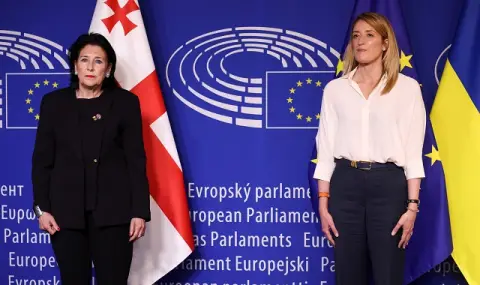The opposition in Georgia is boycotting the presidential elections in the country, which are due to take place this Saturday, and the only candidate is from the ruling party "Georgian Dream". Why is he unacceptable to the rest of Georgian society?
On December 14, presidential elections will be held in Georgia. However, these are not ordinary elections. The atmosphere is tense - for two weeks now, mass protests have been taking place in the country, against which the authorities are using force. Behind them is the confrontation between the ruling party "Georgian Dream" and the opposition. After the parliamentary elections in October, the situation escalated, and later the government announced that it was suspending negotiations for accession to the European Union, which further inflamed the conflict.
The head of state has limited powers
The crisis also grew after a constitutional change. In 2017, the parliament adopted amendments to the basic law with a majority of “Georgian Dream”. They changed the procedure for electing the president. In addition, most of the powers of the head of state were taken away.
The presidential elections in 2018 were the last in which the president was elected directly by the people. Salome Zurabishvili, whose candidacy was supported by the ruling party, became president. However, later, relations between the pro-European Zurabishvili and the pro-Russian party “Georgian Dream” have become tense.
The upcoming presidential elections will be held according to the new procedure. For the first time, the head of state will be determined by an electoral college, which includes 300 people - 150 deputies from the newly elected parliament and 150 delegates from different regions of the country. “Georgian Dream” has a majority in parliament and great influence in local government in individual regions. This means that there is no chance of an opposition candidate becoming president.
The opposition boycotts the elections
The opposition boycotts the newly elected parliament and the presidential elections, and therefore the only candidate for president is the one nominated by “Georgian Dream”. In the National Assembly elections in October, the ruling party sent 89 deputies out of a total of 150 in the Georgian parliament. However, the vote was marred by a number of problems that led the EU to demand new elections. The opposition has accused the government of widespread electoral fraud and is refusing to enter parliament.
President Salome Zurabishvili also does not recognize the election results and claims that she is currently the only legitimate state representative in Georgia. She refuses to leave office until new parliamentary elections are held.
Georgian political scientist Gela Vasadze believes that the upcoming presidential elections will not be legitimate. "How can elections be held if the parliament is illegitimate?" he asks. According to him, the vote was marked by electoral fraud and was not recognized by Georgian society. "But the most important thing is that the constitution was defiled when the first session of the parliament was not opened by the head of state, and at that time the president and representatives of the opposition filed a lawsuit with the Constitutional Court for election fraud," the expert says.
The ruling party's candidate is a former football player
"Georgian Dream" nominated Mikhail Kavelashvili, a former football player and member of the ruling party "People's Power", as a candidate for president. A number of Georgian activists believe that he is one of the authors of the controversial law on "foreign agents". Its adoption caused huge protests in the country and a deterioration in its relations with the West. Some Georgians also find Kavelashvili unsuitable because he did not complete higher education.
Kaveshvili accuses the opposition of being “controlled by members of the US Congress,” who he claims want to provoke a “revolution” in Georgia under conditions similar to those in Ukraine in 2014. Political expert Gela Vasadze believes that Kavelashvili cannot be considered elected president, but only “appointed.” According to the political scientist, it is impossible to hold fair elections in Georgia under the current conditions.
More protests are coming
At the same time, the ruling party warned President Salome Zurabishvili that she must leave the presidency in Tbilisi by December 29. That is when the new president is expected to take office.
It seems that the government is worried about more protests. “The organizers of criminal activities want to thwart the presidential elections on December 14 and prevent the election of a new president by any means”, reads an official statement from the State Security Service on December 10.
The agency claims that the alleged perpetrators want to “escalate the situation as much as possible”, which would lead to “two or three victims”. According to the security service, the goal was to accuse the government of “murder” in order to “further inflame protest sentiment”.
